The Search Wars: Is Google Losing Its Crown? [2023 Study]
June 14, 2023 /![The Search Wars: Is Google Losing Its Crown? [2023 Study]](/blog/uploads/medium_social_media_search_engine_study_17e67f9b87.jpg)
![The Search Wars: Is Google Losing Its Crown? [2023 Study]](/blog/uploads/medium_social_media_search_engine_study_17e67f9b87.jpg)
Have you ever found yourself scrolling social media to look for information?
Like a place to eat on Instagram, a local business on Facebook, or a product review on YouTube?
If so, you're not alone.
So—
At ePassportPhoto, we've decided to poll 730+ Americans to understand why we sometimes turn to social media over Google to search for things.
Let's dive right in:
Let's begin with some background.
At Fortune's Brainstorm Tech conference in 2022, a Google exec mentioned that ~40% of youngsters (ages 18 to 24) turn to TikTok or Instagram when looking for a place to lunch instead of Google Search or Maps.
So from our end, we wanted to gauge how often internet users of all generations find themselves using social media to discover new places or search for information.
The results are in:
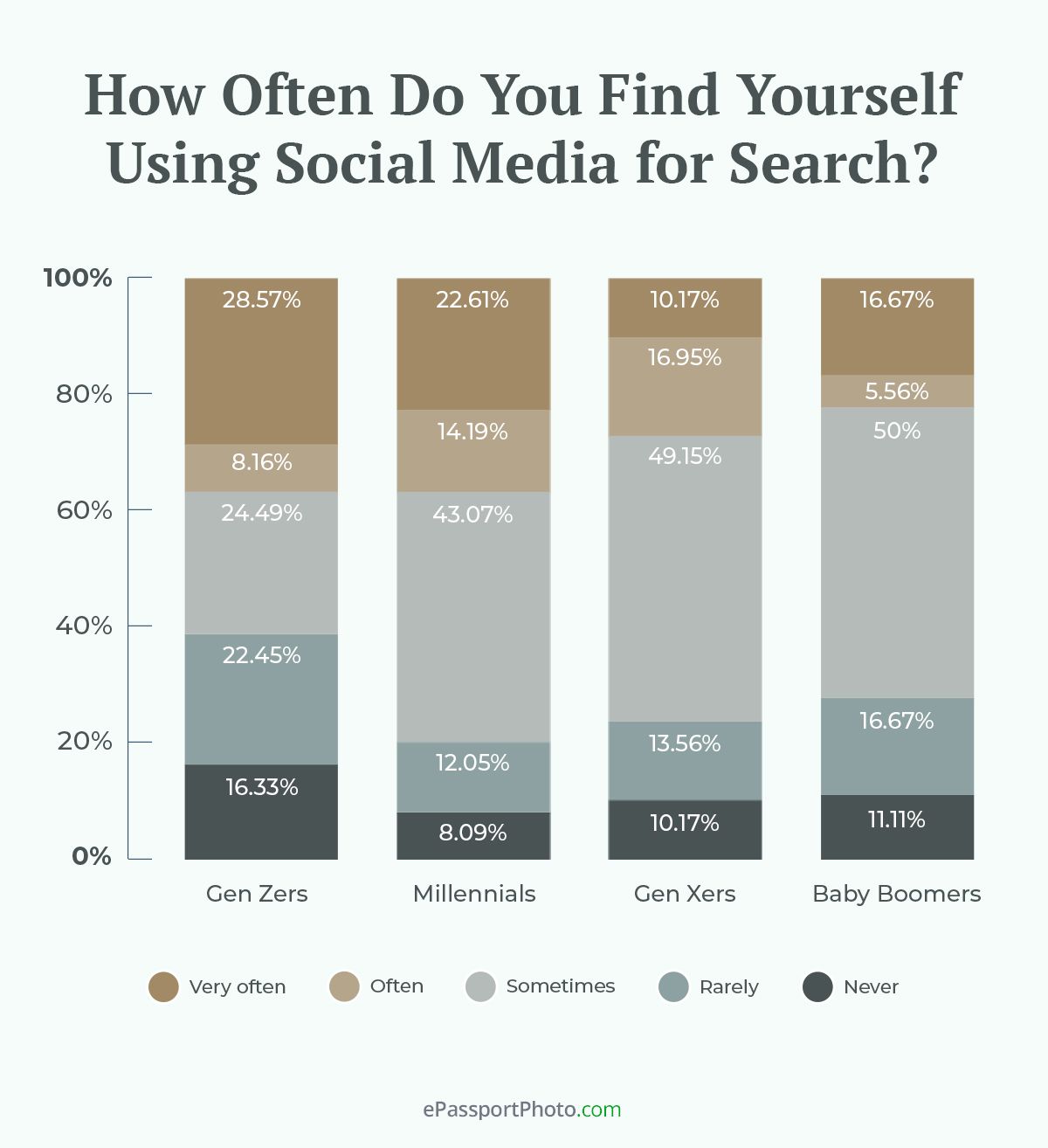
That data shows that Millennials and Gen Zers are leading the way when it comes to using social media to look for information or discover new spots. With an average of 36.80% and 36.73%, respectively, they search on social media often or very often.
As for Gen Xers and Baby Boomers, they’re more likely to sift through 10 blue links.
That figures.
After all, older generations have been using the Mountain View monolith since the early 2000s. Their younger counterparts, on the other hand, have grown up with Facebook, Twitter, and the like.
At this point, we wanted deep dive into what social media platforms are the most popular for search.
Our survey results show that Instagram is slightly ahead of the pack.
Take a look:
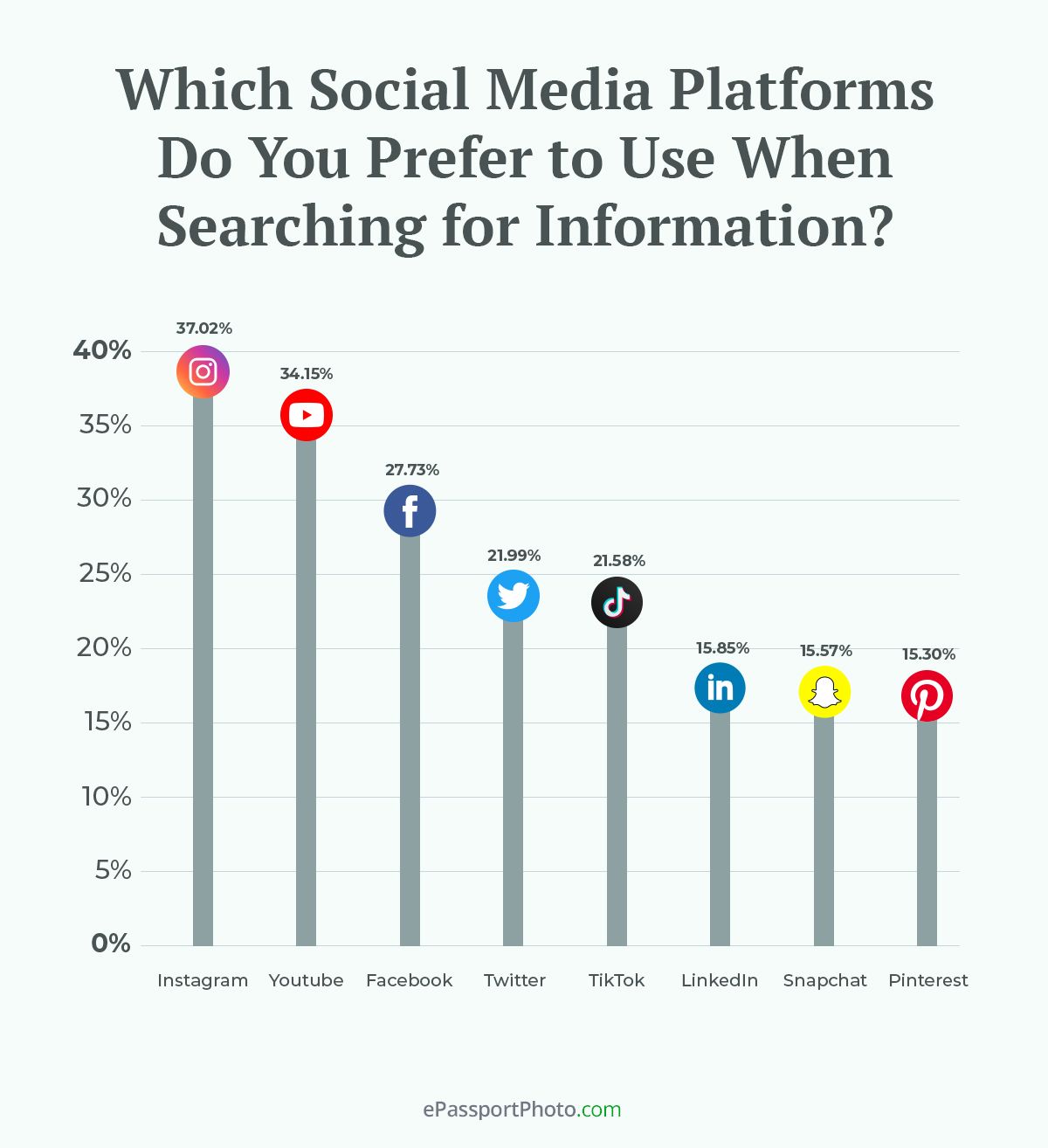
YouTube (34%) and Facebook (28%) came in second and third.
Now—
As a follow-up, we asked survey respondents a somewhat provocative question: "If you could choose only one platform to search for information for the next six months, which would you choose?"
Below are the results:
| Answer Options | Men | Women |
| 52% | 63% | |
| A social media platform of my choice | 48% | 37% |
You can see that Google is still most people’s preferred choice.
But social media has come quite close.
So far, so good.
Now that we've learned more about a growing preference for social media search, particularly among younger generations, let's talk about why.
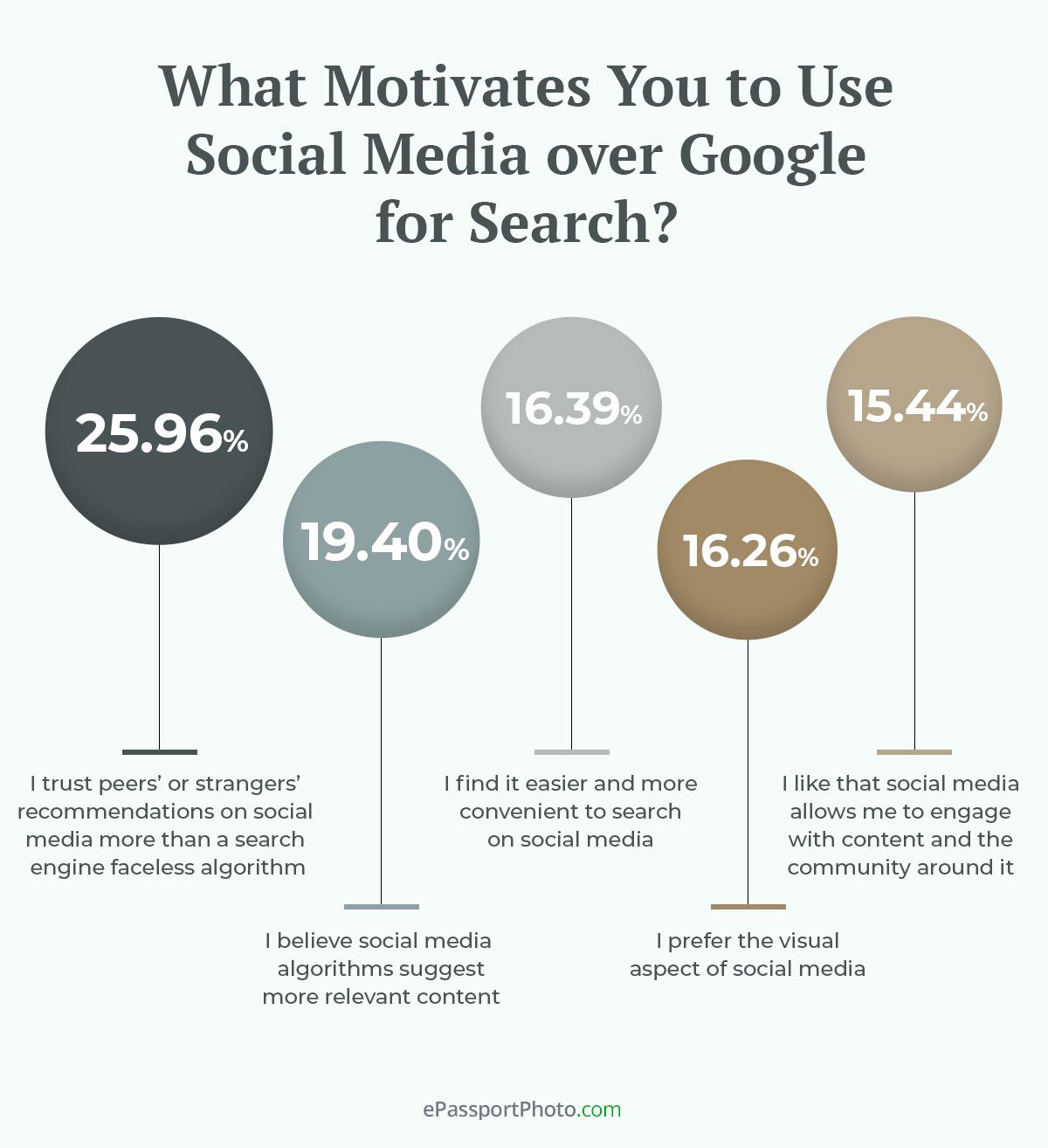
The chart shows that the most commonly cited reason is the trust in peers’ or strangers’ recommendations over search engine algorithms.
If you think about it, that makes sense, at least in certain scenarios.
For example, which of the two would hold more sway: an Instagram post of your friend or influencer showcasing the top three Mexican spots in town with mouth-watering B-roll footage or a Google Maps list of the same?
(You make the call.)
The other two reasons on the podium were more relevant content (19%) and convenience at 16%.
Regarding relevancy, social media algorithms hold a treasure trove of data on our behaviors and preferences. That helps them serve relevant content tailored to our interests.
Similarly, it's easier to type a few words into a search box in the social media app you already have open than fire up Google and peck away at a search query.
Did you know?
Google now indexes Instagram and TikTok videos.
That means you can search for a keyword followed by “TikTok,” and Google will return rows of results of TikTok videos above the standard links.
For example, you can type [how to change a tire + TikTok] and get a wide array of educational videos that show you how to do it.
It's neat.
Yet—
It's likely the tech giant's attempt to be users' top pick when they look for information.
Speaking of which, here’s what people typically search for on social media:
| What Kind of Information Do You Usually Look for on Social Media Platforms? | Share |
| Education and learning | 16.93% |
| Entertainment and activities | 16.12% |
| Fashion and beauty | 15.71% |
| Health and medical information | 14.75% |
| Food and recipes | 14.48% |
| Finance and money | 13.93% |
| Travel and tourism | 13.66% |
| Sports and fitness | 12.7% |
| Restaurants and dining options | 12.57% |
| News and current events | 12.3% |
| Shopping and product recommendations | 12.3% |
| Local businesses and services | 11.07% |
As you can tell, education and learning came out on top at 17%.
Entertainment and activities (16.12%), fashion and beauty (15.71%), and health and medical information (14.75%) follow.
While travel and tourism took only the 7th spot, we still wanted to delve deeper into these searches, since this vertical is our bread and butter.
So—
Here's what we found:
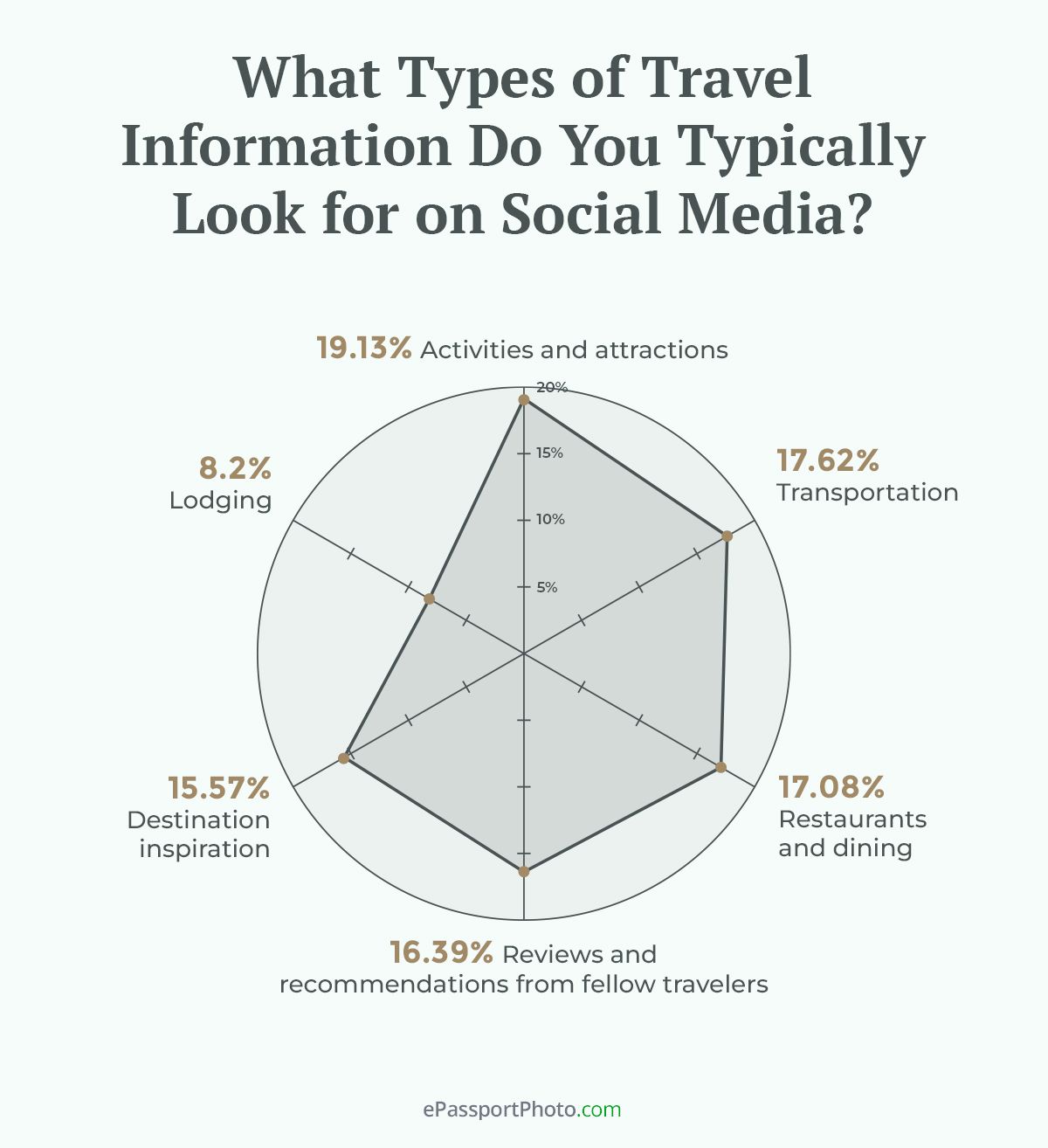
Lastly, we asked respondents if they'd ever found information on social media they couldn’t find on Google.
For 84% of people, it was a resounding “Yes.”
Wow.
It's no secret:
We live in an age where information is abundant.
But—
As countless studies have proven, not all of it is accurate (the "Kentucky Fried Rat" legend is a prime example.)
That's why we wanted to see which of the two people trust more regarding information accuracy: Google or social media.
The results are in:
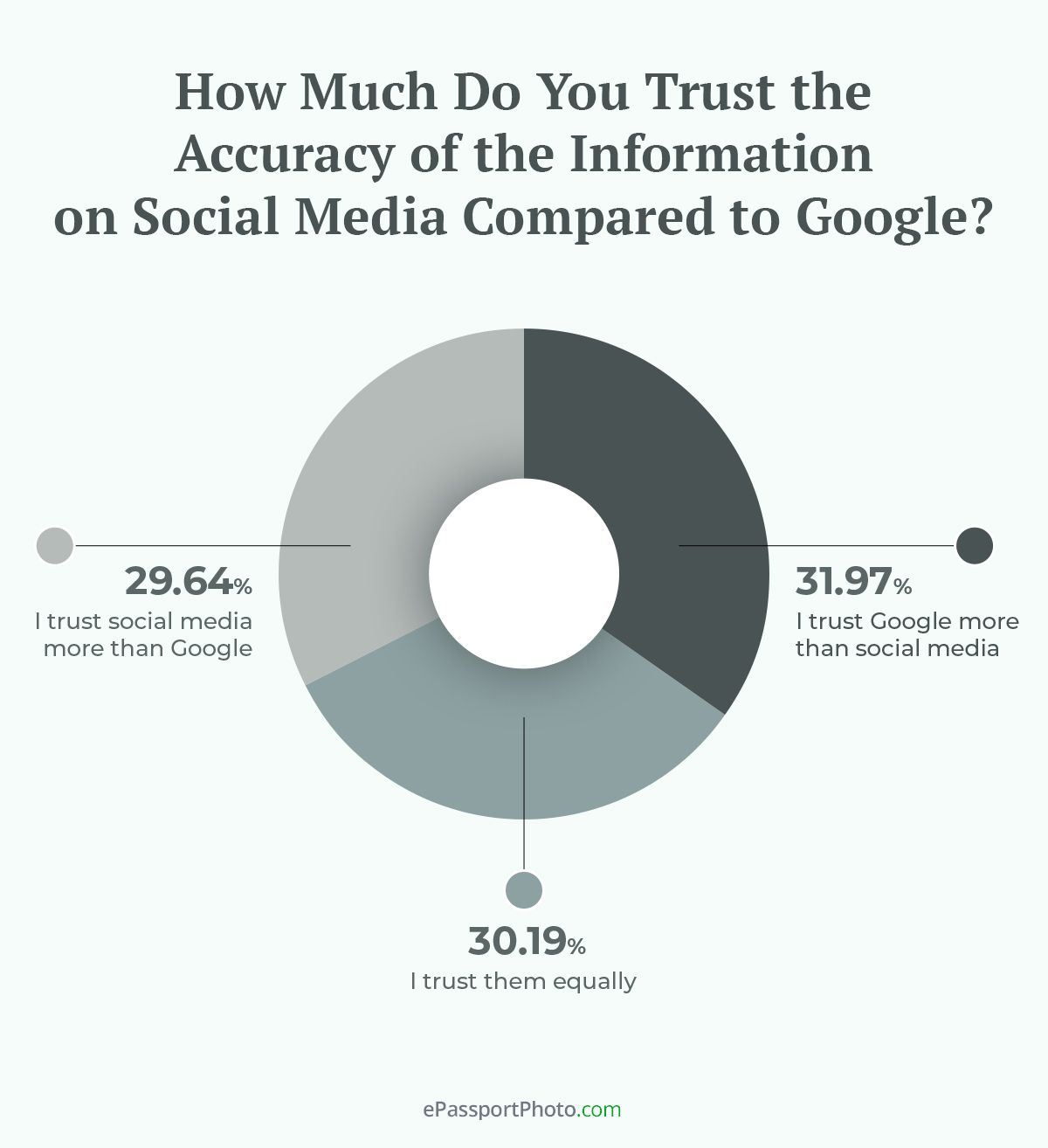
The chart shows that Google is slightly ahead of social media: 31.97% vs. 29.64%. Another 30.19% indicated they trust both equally.
Yet, a somewhat different picture emerged when we asked respondents to indicate the extent to which they agreed or disagreed with the statement in the chart below:
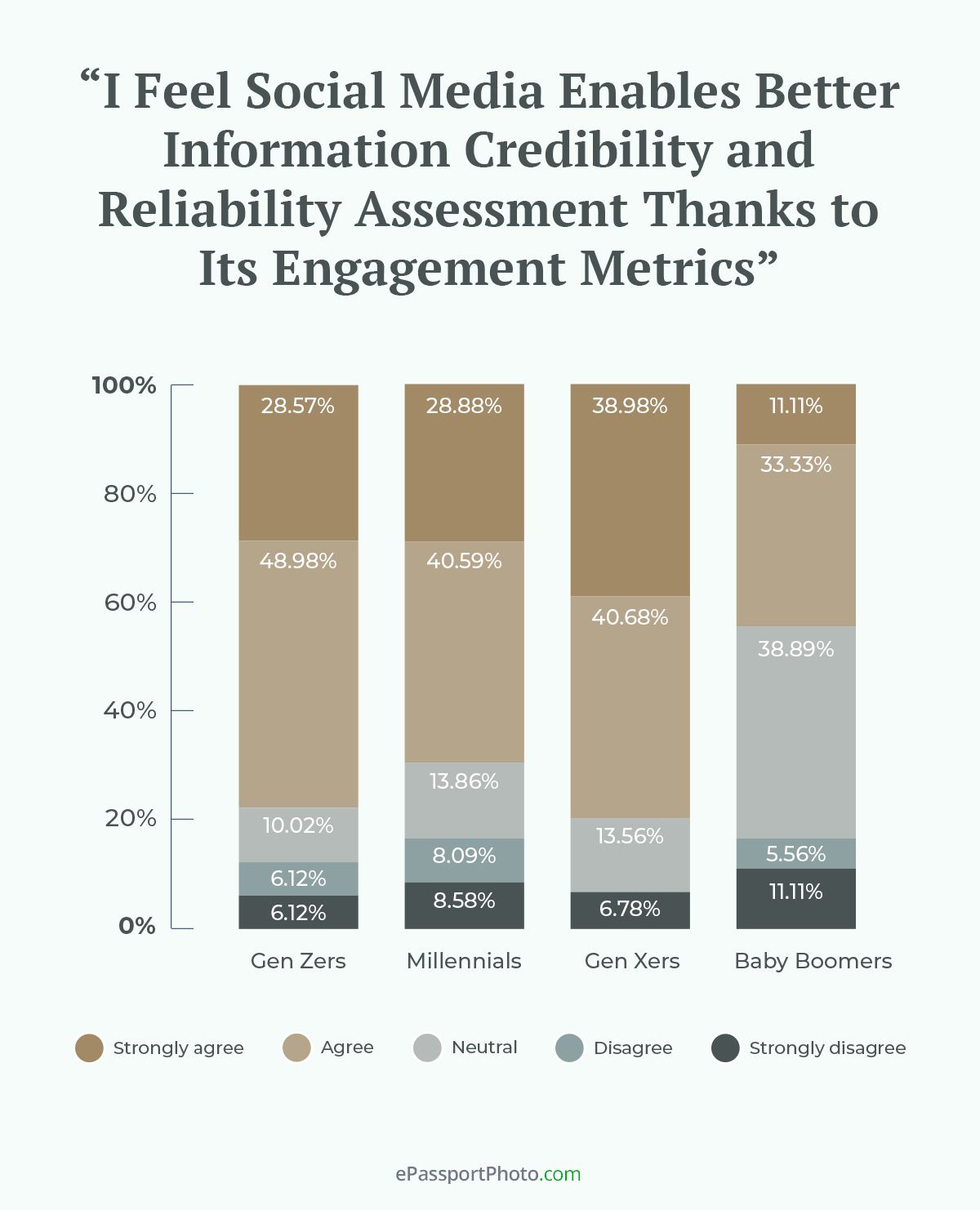
This time, an average of 67.78% of respondents acknowledge that social media allows them to better assess the credibility and reliability of information.
All thanks to engagement metrics such as shares, likes, comments, and views, some of which aren't always available on Google.
Now that’s some food for thought.
We conducted an online survey of 732 US internet users via a bespoke online polling tool in March 2023.
The respondents were 87.7% male and 12.3% female. 6.7% of respondents were 26 or younger, 82.8% were aged 27–42, 8.1% were 43–58, and 2.5% were aged 59–68.
This survey has a confidence level of 95% and a margin of error of 4%. Given the gender and age makeup of our sample size, the study’s findings are statistically significant for the population at large.
This study was created through multiple research steps, crowdsourcing, and surveying. Data scientists reviewed all survey participants' responses for quality control. The survey also had an attention-check question.
Did our findings help you learn more about how social media is challenging Google? If you believe your audience will be interested in this information, feel free to share it. Just remember to mention the source and link back to this page.